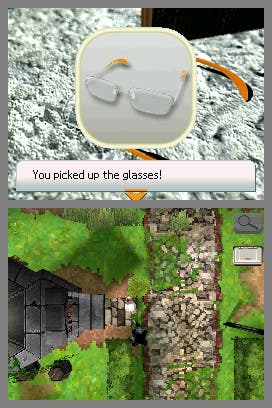The DS' Great Adventure
How Nintendo's handhold has provided a new home for a displaced genre.
What comes to mind when you think about the DS? Endless Brain Training knock-offs? Patrick Stewart with his funny beard in the TV advert? Various disturbing budget games in which little girls look after genital-free babies? The DS has become so successful, so ubiquitous, in recent years that it's easy to forget that when it started out, pre-Lite, it was something of a kooky oddity. We wrote an entire love letter about how delightfully strange it was just two years ago. Now the DS' image has suffered; we've forgotten that it's the console that inspired weirdness and creativity like no other, because all we see is endless, imagination-devoid shovelware aimed at either your mum or your daughter.
It's a side to the DS that many of us have forgotten about, and yet there are still many odd, lovable games being released for the system, games that just wouldn't fit anywhere else - many of them adventure games. The DS has become something of a second home for this wandering genre. Interactive-novel style text-based storytelling and obscure puzzles are perfectly suited to a portable gaming system, and the touch-screen has given the genre opportunities that it never had before. Aside from the obvious ease of pointing and clicking, the DS offers easy note-taking, myriad touch-based puzzling, and a dual-screen format that has been put to delightfully unobvious use. DS adventure games have become a genre all of their own, retaining many of the strengths of traditional point-and-click but distinguishing themselves in style, tone and inventiveness.
The first hint that the DS might be something a bit special for the adventure genre was Another Code, a Cing-developed early point-and-click for the system that gave an early indication of how the DS can be used as an object within games as well as a system for playing them. This is a good place to start for DS adventure gamers; at the time of its release it left us wanting more, tantalised by the prospects it offered for DS-unique puzzles but unsatisfied by its length and slightly light plot. Nowadays it serves as an appetiser for the other, more complex delights that are also now available. That's not to say that Another Code is without its own merit - two or three of its DS-based puzzles are still without equal, leaving you stuck for hours before you realise the elegantly simple solutions.

Cing really excelled itself a little later with Hotel Dusk: Room 215, which took a darker, character-driven and more in-depth route than Another Code's inventive but short-lived, puzzle-driven narrative. As its unusual, effective visual style attests, it's an astonishingly ambitious game for such a little system; as bitter, battered ex-cop Kyle Hyde, you explore the seedy, dead-end Hotel Dusk in almost-3D, talking to its fleshed-out and well-written inhabitants whose visual depictions, conversely, are never more than sketched outlines. This is one of the only games I can think of in which conversations with characters feel like actual interaction; discussions run off on tangents and characters have depth and guarded secrets. The in-game notebook is a stroke of genius - it makes you feel like you actually are Kyle Hyde, playing his part and discovering things along with him, rather than driving him along a path towards the end of a story. The art style, too, is hugely effective; to Kyle Hyde, no person is much more than a sketch, and only as you get to know him and Hotel Dusk's other guests better does your imagination begin to colour the picture. And, of course, it's full of excellent puzzles.
Hotel Dusk is so successful that it makes us sad that other DS adventure games opt for a more irreverent, light-hearted tone - Hotel Dusk shows us that there is room for real character-driven, text-heavy pieces of interactive fiction on the DS, and I for one would be glad to see more of them. Perhaps its polar opposite in tone are the Touch Detective games, which have somehow escaped the notice of pretty much everyone despite their considerable charms and genuinely great humour, possibly because the series is a niche Japanese import. This is our niche, though, and Touch Detective holds a prominent place within it.

